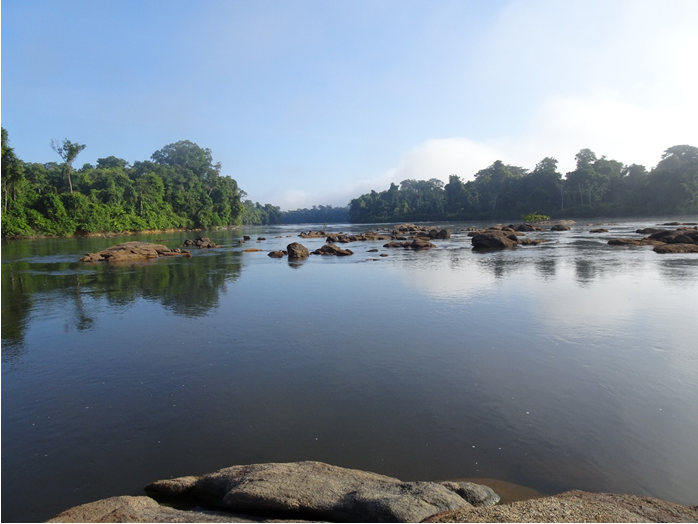
Newsroom
Over Half of World's Rivers Fish Faunas Strongly Impacted by Humans

The Oyapock river, flowing between Brazil and French Guiana, is among the rare rivers from South America with a fish fauna still little impacted by humans. (Credit: Sébastien Brosse)
An international joint study involving Dr. SU Guohuan from the University of Toulouse III, France and Prof. XU Jun from the Institute of Hydrobiology (IHB) of the Chinese Academy of Sciences revealed that more than 50% of the world's river fish faunas experienced marked changes in biodiversity due to human activities. This study was published in Science.
Although rivers and lakes cover less than 1% of Earth's surface, they support a substantial component of the planet's biodiversity, including a quarter of Earth's vertebrates. Further, freshwater systems support the functioning and stability of a variety of ecosystems, including those that contribute to human wellbeing.
Centuries of human activities - overfishing, non-native species introductions, dam constructions, water pollution and climate change - have directly impacted freshwater biodiversity. These activities all threaten rivers systems and some of which can alter the local species diversity.
To find out the global scale and magnitude of human impact on freshwaters in order to better protect river systems, the researchers collected the fish data and human-related variables for 2,456 river basins worldwide.
To have a holistic view of the changes in biodiversity, they developed an index called “Cumulative Change in Biodiversity Facets (CCBF)” to measure change in a specific area based on six key biodiversity indicators, i.e., taxonomic richness, funcitonal richness, phylogenetic richness, taxonomic dissimilarity, functional dissimilarity, and phylogenetic dissimilarity. This CCBF index provides a score ranging from 0 - 12. A score higher than six indicates substantial biodiversity change.
The results showed that 53% of the world's river basins had undergone marked changes in biodiversity - particularly in temperate regions. Those least impacted river basins were mostly small-sized, occupying only 13.4% of the world river basin surface, and supporting only 21.7% of the world fish fauna.
They noted that conserving freshwater fish diversity in the least impacted rivers alone will remain below the target to protect at least 30% of Earth's surface by 2030, as proposed by a broad coalition of environmental organizations. Protection must also focus on areas where biodiversity has already been eroded by human activity.
The CCBF framework also provides a method to quantify the impacts of humans on global biodiversity for other taxa and ecosystems.
This research has caused a huge impact internationally, and many well-known media have run interviews and reports, including National Geographic, BBC news, Bloomberg, The Guardian, New Scientist, The Independent, among others.